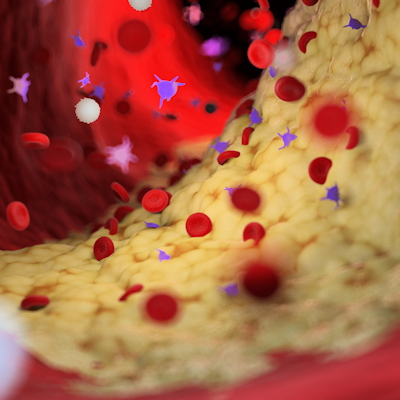March 31, 2023 -- An analysis of blood RNA from patients with angiographically confirmed coronary artery disease has shown how RNA biomarkers may be used to confirm heart disease.
The study, published March 25 in the Journal of Molecular and Cellular Cardiology Plus, furthers the current understanding of heart disease and could potentially lead to a simple blood test for diagnosing heart disease in a doctor's office.
Cardiovascular disease had a global prevalence of 523 million cases and 18.6 million deaths in 2019. When patients experience chest pain or shortness of breath, doctors may struggle to correctly diagnose whether the problem is caused by coronary artery disease, since these classic symptoms are nonspecific and may stem from other medical issues such as acid reflux or pinched nerves. People often don't know they have heart disease until they suffer a potentially lethal heart attack.
The current standard for diagnosing heart disease is a coronary angiography, either by invasive catheterization or computed tomography, yet 20% to 40% of angiograms ultimately return a result of no blockage. Both doctors and patients would likely benefit from additional diagnostic tools to detect heart disease in a less-invasive, more cost-effective way.
Prior studies employed single-molecule, amplification-independent RNA sequencing of whole blood to identify an RNA signature in patients with angiographically confirmed CAD. For this study, the researchers employed Illumina total RNA sequencing (RNAseq) and network co-expression analysis to identify systematic changes underlying CAD.
Whole-blood RNA was depleted of ribosomal RNA (rRNA) and analyzed by RNAseq to identify transcripts associated with CAD in 177 patients presenting for elective coronary catheterization. The resulting transcript counts were compared between groups to identify differentially expressed genes and to identify patterns of changes through whole genome co-expression network analysis.
Upon analysis of the differentially expressed genes, the researchers found they were related to decreasing abundance or differentiation of T cells, especially T regulatory cells (Tregs), a specialized subpopulation of T cells that suppress immune response, thereby maintaining homeostasis. The differentially expressed genes were functionally related to ciliary components that compose the immune synapse. The RNA changes were consistent with T cell-related changes in the immune synapse, which may help to eventually define the precise cellular mechanisms of atherosclerotic lesion formation and suggest future optimal diagnostic and therapeutic targets.
The researchers concluded that their study confirms a novel mRNA signature of a Treg-like defect in CAD. The pattern of changes was consistent with stress-related changes in the maturation of T cells and Tregs, possibly due to changes in the immune synapse. The results indicate that CAD has an understudied component that may be similar to other autoimmune diseases, such as lupus and psoriasis.
Disclosure
Several of the study's authors have equity interest in True Bearing Diagnostics, a company developing RNA biomarkers for diseases including coronary artery disease.
Copyright © 2023 scienceboard.net












